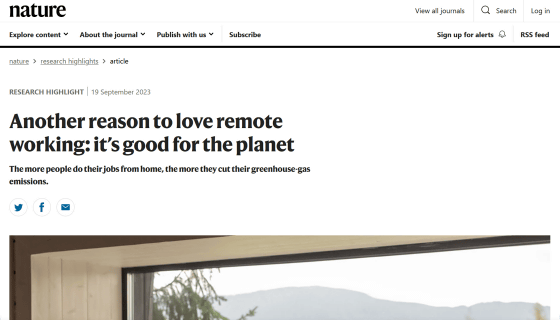Research results show that people who always work remotely emit about half as much carbon dioxide as those who work in an office

During the COVID-19 pandemic, more companies have promoted remote work to reduce unnecessary contact with others, but in recent years many technology companies have reduced or eliminated remote work. We are. A study by Cornell University and Microsoft showed that employees who always work remotely reduce their carbon footprint by about half compared to those who work in an office.
Another reason to love remote working: it's good for the planet

Lifestyle impacts green benefits of remote work | Cornell Chronicle
https://news.cornell.edu/stories/2023/09/lifestyle-impacts-green-benefits-remote-work
People who work from home all the time 'cut emissions by 54%' against those in office | Greenhouse gas emissions | The Guardian
https://www.theguardian.com/environment/2023/sep/18/people-who-work-from-home-all-the-time-cut-emissions-by-54-against-those-in-office
Many people would agree with the statement that 'remote work reduces carbon dioxide emissions because you don't have to commute by train or car,' but in reality, commuting is the only link between work and carbon dioxide emissions. It doesn't stop there. To understand this in detail, we need to examine multiple factors, such as the impact of rush and traffic congestion during commuting, energy usage in the office, and energy usage when working from home.
The researchers used multiple datasets, including data from Microsoft employees on commuting and telework, to estimate the carbon footprint of office workers, remote workers, and hybrid workers who alternate between office and remote work in the United States. I predicted it.
The analysis showed that remote workers who work from home all the time have a 54% lower carbon footprint compared to office workers who work five days a week. On the other hand, it was found that hybrid workers who work from home two to four days a week reduce carbon dioxide emissions by 11 to 29%, while those who work from home one day a week reduce emissions by only 2%.

The reduction in carbon emissions among remote and hybrid workers was primarily due to lower energy use in the office and lower carbon emissions associated with commuting. Additionally, as workers no longer commute to work, traffic congestion during rush hours will be alleviated, resulting in improved fuel efficiency, among other secondary benefits.
On the other hand, remote workers emitted carbon dioxide in different places than office workers, such as by increasing car and plane travel not related to work, and by using home appliances at home. In addition, residential equipment is not necessarily optimized for decarbonization, and there are cases where the same work as an office produces more carbon dioxide.
Also impacting remote and hybrid workers is the relocation to the suburbs due to the COVID-19 pandemic. Some workers, with fewer commute days, have moved their residences from urban areas close to big cities and offices to suburban areas closer to nature, which will increase commuting distances for hybrid workers and increase the use of private cars. It seems that there are also possible effects.
'Remote work is not zero-carbon, and the benefits of hybrid work are not perfectly linear,' said study co-author

While the findings do not apply to many workers who are unable to work from home, they can provide guidance for office-based employers to reduce their overall corporate carbon footprint. Also, it is likely that similar trends will be replicated not only in the United States but also in Europe and Japan.
The research team says, 'Remote work shows the potential to reduce carbon emissions, but to fully realize its environmental benefits, changes in commuting patterns, building energy consumption, vehicle ownership, and commuting It is essential that any unrelated moves be carefully considered.'
Related Posts:
in Science, Posted by log1h_ik







